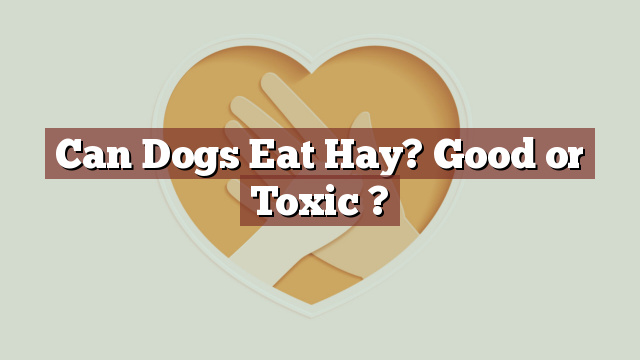Can Dogs Eat Hay? Good or Toxic?
As responsible pet owners, it is crucial to be aware of what foods are safe for our furry friends to consume. With so many different types of food available, it can be confusing to determine what is beneficial and what is harmful for our dogs. One such food that often raises questions is hay. So, can dogs eat hay? Let’s explore the topic further to understand whether hay is a suitable addition to a dog’s diet.
Nutritional Value of Hay: What Does it Provide for Dogs?
Hay is primarily made up of dried grasses, legumes, or other plants. It is commonly fed to livestock, such as horses and cows, as it is an excellent source of fiber. However, when it comes to dogs, their dietary requirements are quite different. Dogs are primarily carnivores and thrive on a diet rich in animal protein. While hay does contain some nutrients, such as vitamins and minerals, it is not a significant source of essential nutrients for dogs.
Can Dogs Eat Hay? Exploring Safety and Toxicity.
Can dogs eat hay? The simple answer is yes, dogs can technically eat hay without immediate harm. However, it is essential to note that hay is not a natural part of a dog’s diet and can have potential adverse effects.
Hay can be difficult for dogs to digest due to its high fiber content. This can lead to gastrointestinal issues, including constipation, bloating, and upset stomach. Additionally, certain types of hay may contain mold, dust, or other allergens that can trigger respiratory problems or allergic reactions in dogs.
It is crucial to ensure that the hay given to dogs is clean, free from any signs of mold or mildew, and not treated with any harmful chemicals or pesticides. Always opt for high-quality hay and consult with a veterinarian before introducing it to your dog’s diet.
Potential Risks or Benefits of Dogs Consuming Hay.
While hay may not provide significant nutritional benefits to dogs, there are potential risks associated with its consumption. As mentioned earlier, the high fiber content of hay can lead to digestive issues in dogs, including blockages in the intestinal tract. In severe cases, this can require surgical intervention.
On the other hand, some dogs may benefit from nibbling on hay in moderation. It can act as a natural teeth cleaner, helping to remove tartar and promoting dental hygiene. However, it is essential to monitor your dog closely and ensure they are not ingesting excessive amounts of hay that could lead to digestive problems.
What to Do If Your Dog Eats Hay: Steps to Take.
If you suspect that your dog has consumed hay and is experiencing digestive issues, it is crucial to take prompt action. Here are a few steps to consider:
-
Observe your dog: Monitor your dog closely for any signs of discomfort, such as vomiting, diarrhea, or bloating.
-
Contact a veterinarian: If your dog is showing severe symptoms or if you are unsure about the potential risks, it is best to seek professional advice. A veterinarian will be able to provide guidance based on your dog’s specific situation.
-
Adjust the diet: After consulting with a veterinarian, you may need to adjust your dog’s diet to help alleviate any digestive issues. This may involve adding more easily digestible foods or providing specific treatments.
Conclusion: Understanding the Role of Hay in a Dog’s Diet.
In conclusion, while dogs can technically eat hay, it is not a recommended or necessary addition to their diet. Hay does not provide significant nutritional benefits for dogs and can potentially cause digestive issues. It is always best to consult with a veterinarian before introducing any new food into your dog’s diet.
As responsible pet owners, it is our duty to prioritize our dog’s health and well-being. By understanding the potential risks and benefits of different foods, including hay, we can make informed decisions regarding our dog’s diet and ensure their overall health and happiness.
Thank you for investing your time in exploring [page_title] on Can-Eat.org. Our goal is to provide readers like you with thorough and reliable information about various dietary topics. Each article, including [page_title], stems from diligent research and a passion for understanding the nuances of our food choices. We believe that knowledge is a vital step towards making informed and healthy decisions. However, while "[page_title]" sheds light on its specific topic, it's crucial to remember that everyone's body reacts differently to foods and dietary changes. What might be beneficial for one person could have different effects on another. Before you consider integrating suggestions or insights from "[page_title]" into your diet, it's always wise to consult with a nutritionist or healthcare professional. Their specialized knowledge ensures that you're making choices best suited to your individual health needs. As you navigate [page_title], be mindful of potential allergies, intolerances, or unique dietary requirements you may have. No singular article can capture the vast diversity of human health, and individualized guidance is invaluable. The content provided in [page_title] serves as a general guide. It is not, by any means, a substitute for personalized medical or nutritional advice. Your health should always be the top priority, and professional guidance is the best path forward. In your journey towards a balanced and nutritious lifestyle, we hope that [page_title] serves as a helpful stepping stone. Remember, informed decisions lead to healthier outcomes. Thank you for trusting Can-Eat.org. Continue exploring, learning, and prioritizing your health. Cheers to a well-informed and healthier future!

